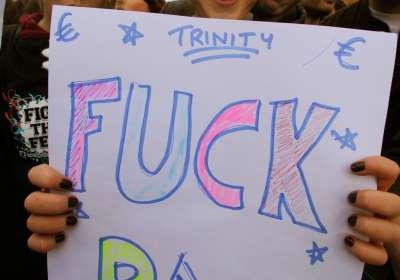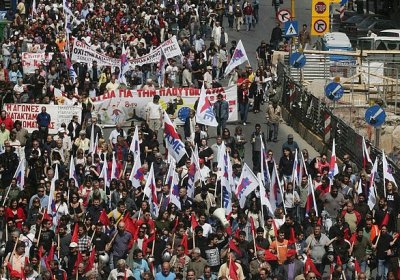The Irish Republic’s government said on November 4 that it wants to slash 6 billion euros from its 2011 deficit, MorningStarOnline.co.uk said the following day. The cuts were announced despite the government admitting it would lead to lower economic growth.
Ireland’s deficit is set to reach an astronomical 32%, MorningStarOnline.co.uk said, mainly because the government’s bailout of the banks with public funds cost 31 billion euros.
The country has already endured two years of recession driven by the bail-out costs and a doubling of unemployment to 13.6%.
Ireland
About 25,000 students took to the streets of Dublin on November 3 in protest at plans to increase college registration fees, MorningStarOnline.co.uk said. Many protesters wore T-shirts calling for “Education, not emigration”, referring to a recent surge of young people leaving Ireland with its double-digit unemployment for opportunities abroad, from Canada to Australia.
During UN Disarmament Week (October 24-31), a bill to enact the UN Convention banning Cluster Munitions is to be tabled in the House of Representatives. However, it is unlikely to contain a provision prohibiting financial institutions from funding manufacturers of cluster bombs.
It has been found that the ANZ bank has provided loans of $136.5 million to producers of cluster bombs.
Last month, I stood in the Guildhall Square in Derry and watched as the relatives of the 14 innocent victims of the British Parachute Regiment expressed their delight at the Saville report’s conclusion that the 14 were innocent victims.
At the time of the killings the dead were labelled as terrorists by the British government. The British system and, to its shame, much of the British media, accused those who had been shot of being “gunmen” and “bombers”.
Thousands of republicans from across Ireland gathered on July 20 in Sallins, County Kildare, to honour Theobald Wolfe Tone, known as “the father of Irish republicanism”. Tone led an uprising against British rule and for an Irish republic in 1798. When it was defeated, Tone was sentenced to death.
The proposal for a visit to the 26 Irish counties that make up the southern state by the British head of state, Queen Elizabeth II, has drawn condemnation from Irish republicans.
Irish Taoiseach (head of government) Brian Cowan announced in June plans for a royal visit, believed to be for sometime in 2011. It would be the first visit by the British head of state to the southern Irish state since it was founded in 1921.
The publication of the Saville Report, the inquiry into the British army massacre of 14 civil rights protestors in Derry in the north of Ireland in 1972, confirmed what the victims’ families had always known — that those shot had been unarmed and posed no threat to the British Parachute Regiment.
On June 15, something amazing happened: British Prime Minister David Cameron apologised for the British army shooting Irish people.
“It was wrong”, said Cameron, after a government inquiry found the British army was responsible for the killing of 14 unarmed civil rights demonstrators, seven of them teenagers, in the 1972 Bloody Sunday massacre in Derry.
On January 30, 1972, up to 30,000 people marched in Derry, in the six Irish counties occupied by Britain, to demand an end to internment, a policy that allowed for the jailing of people without trial.
Resistance is building in Europe against government attempts to force ordinary people to bailout the failed financial system of “casino” capitalism.
After four general strikes in Greece this year, and two more planned, strike action is beginning in Spain against planned attacks on public services and welfare.
The family of Aidan McAnespie, shot dead by a British soldier after he passed through a checkpoint on the Monaghan/Tyrone border between the Republic of Ireland and the six counties of British-occupied Northern Ireland 20 years ago on his way to a football match, say a new report into his death heralds another phase in their campaign for the truth.
It started out as a good day for justice and rapidly became a good day for democracy too.
The six anti-war activists who occupied arms manufacturer Raytheon’s offices in Derry and destroyed its computers — part of the Raytheon 9 who took part in the action — have been acquitted by a jury in Belfast on June 11.
- Previous page
- Page 13
- Next page







